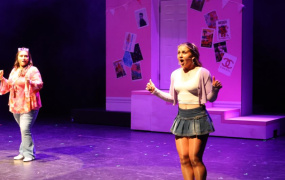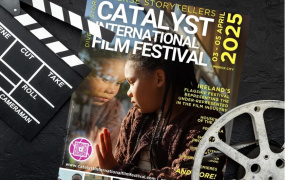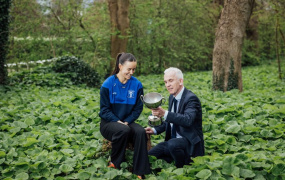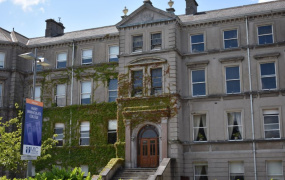Media, Sport and Ireland Symposium 2022
The Media, Sport and Ireland International Symposium will take place on 19 and 20 May 2022. Organised by the Sport & Exercise Research Group, NUIG in association with the Department of Media and Communication Studies, Mary Immaculate College, the venue for this blended event is the Moore Institute, NUI Galway.
On behalf of the Sport & Exercise Research Group, NUIG in association with the Department of Media and Communication Studies, Mary Immaculate College, we are pleased to announce that the final programme for the symposium (including abstracts and biographical notes) is now available to view and download here.
Due to the number and quality of abstract submissions, the symposium has been extended to two days. It will be a blended event. The campus venue is GO10, Hardiman Research Building/Moore Institute, NUI Galway (number 20 on the campus map).
Those wishing to attend the symposium either on campus or online should contact the organisers in advance at the following email address: msinuig2022@gmail.com. Links for the panels will be provided to online attendees in advance.
This symposium brings together sports scholars from across the humanities and social sciences whose work is variously concerned with the contemporary and historical cultural significance of sport, and which deals with the interplay between sport, the media and cultural industries and the lived experience of sport as popular culture in Ireland and across the Irish diaspora. It extends the ‘Sport, Media and the Cultural Industries in Ireland’ symposium, hosted in Dublin City University in 2018, and the subsequent collection Sport, the Media and Ireland: Interdisciplinary Perspectives (eds. Neil O’Boyle and Marcus Free). Panels will cover a variety of topics of national and international significance, including
- Online hate and sport
- Media and gender inequality in sport
- The impact of Covid-19 on sport and sport media
- Media, migration and sport
- Transnational marketing and the reception of sport
- Media representations of ‘reform’ in sport
Organising Committee:
- Dr Seán Crosson, NUI Galway
- Dr Marcus Free, Mary Immaculate College, University of Limerick
- Dr Niamh Kitching, Mary Immaculate College, University of Limerick
- Dr Katie Liston, University of Ulster
- Dr Neil O’Boyle, Dublin City University
The Symposium Call for Papers (Now Closed)
Sport occupies a central position in Irish social and cultural life, yet a relatively marginal position within the academy. This symposium aims to bring together sports scholars from across the humanities and social sciences whose work is variously concerned with the contemporary and historical cultural significance of sport, and which deals with the interplay between sport, the media and cultural industries and the lived experience of sport as popular culture in Ireland and across the Irish diaspora. Building on the success of the ‘Sport, Media and the Cultural Industries in Ireland’ symposium, hosted in Dublin City University in 2018, and the subsequent collection Sport, the Media and Ireland: Interdisciplinary Perspectives (edited by Neil O’Boyle and Marcus Free), it is hoped that this symposium will become a vehicle for establishing a distinct national research network in Ireland north and south. It is intended that the symposium will lead to the publication of a dedicated journal issue and/or collection that will create and inspire further dialogue between researchers working in various disciplines, including, but not exclusively, media, communication and cultural studies, film studies, sociology, gender studies, sport science and physical education, history, geography and politics. In addition to examining the current ‘state of play’ of Irish themed sports research, the symposium and projected volume aim to reflect on the interrelations of sport, the media and cultural industries in order to identify historical continuities and changes, and both shared transnational patterns and national/local specificities.
Regarding the impact of the media and cultural industries on sport, the following thematic strands may be of particular interest to potential contributors, but this is not a comprehensive list.
Hutchins and Rowe (2009) use the term ‘media sport content economy’ to describe the recent shift that has taken place in the transmission of sports content, from a context of television dominance to a more complex multimedia environment characterised by digital plenitude. In practice, this term suggests that sports scholars must be attentive to how the rise of digital technologies – such as social media and video-hosting sites like YouTube – are impacting traditional sports coverage and commentary as it unfolds ‘live’ and as it is re-mediated through these platforms. These developments have greatly impacted how sport is played, made, consumed and enjoyed, but they also raise questions for a variety of other fields. For example, what are the implications of media-sport intersections for politics, religion and tourism in the Irish context? How are Irish media sports texts (news reports, advertisements, sponsorship campaigns, etc.) shaped by the industrial contexts they emerge from? What is the relationship between sport, tourism and destination marketing in Ireland? What is the impact of these developments on constructions and negotiations of various forms of collective identity?
A second related international development is the extended variety of commodification of sport, from sponsorship of clubs and national teams to forms of advertising and marketing, to individual sports personalities as ‘brand ambassadors’ for corporate organisations. How are constructions of ‘Irishness’ mobilised in the promotion of ‘native’ and transnational brands, and how does the intersection with the corporate world relate to media and cultural narratives of the changes taking place within the island of Ireland and across the Irish diaspora in the early 21st century? How does ‘Irishness’ intersect with constructions of gender, region and locality in the resulting media and cultural texts?
An important feature of the Sport, the Media and Ireland volume was a section focusing on both the underrepresentation and the quality of representation of women’s sports in Ireland, and on the experiences of female journalists in Irish media. 2020 was to be a landmark year in Irish sports media following the 20x20 campaign to increase participation in, and media coverage of women’s sports in Ireland by 20%. However these aims were adversely impacted by the cancellation of events during the Covid-19 pandemic when gender inequalities in Irish sport, both economically and in cultural status, were repeatedly exposed by the uneven experiences of men’s and women’s sports organisations and athletes. Nonetheless a significant recent development in Irish sports media has been a concern with the gender politics of sports organisation, governance, economic underpinnings and cultural representation, with many critical interventions led by female sports journalists. The 20x20 campaign has arguably played a key role in raising awareness of the issues at stake in women’s and girls’ sports participation and representation. Contributions are invited that explore these and related gender (including LGBTQ+) issues in Irish sports media, and the cultural and social contexts in which sport and sports media are variously discussed, negotiated and contested.
The Covid-19 pandemic negatively impacted, and indeed threatened the very viability of some sports, including, in an Irish context, both professional sports dependent on mass spectatorship, sponsorship and/or television coverage, and predominantly or exclusively amateur sports with weaker financial resources. Research has been growing internationally, since 2020, on the current and likely future impact of the pandemic on sport, but less so on how sports media responded to the absence of sporting events, and how it covered the economic and cultural impact on various sports. We invite papers that address these issues in an Irish or Irish diasporic context.
The final section of Sport, the Media and Ireland dealt with Irish-British dimensions of sport and sports media, from the presence of Irish athletes within British sport to the consumption of Irish media in Britain, and of British media in Ireland. In addition to welcoming papers that extend such cross-border themes in an Irish-British and north-south context, or that explore ‘Irish’ dimensions of sports media circulation within a more transnational context, we also welcome work that concerns the ways in which Irish and international sports media have engaged with the increasingly complex migration flows in Irish sport as indexical of social and cultural changes in 21st century Ireland. How, for instance, have athletes of immigrant origin or parentage been represented in Irish media and social media? How has the international impact of the Black Lives Matter protests been manifested in Irish sports and related media?
As noted, this is a suggested, but not exclusive range of themes as we seek to both establish a network of scholars with related interests and to encourage expansion in the range of research avenues in this field. We especially encourage the participation of early career researchers with any of these or related interests across a wide range of disciplines.







